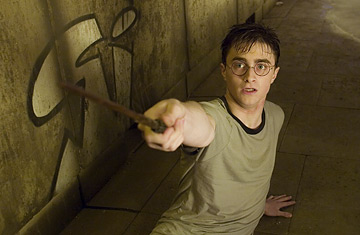
Daniel Radcliffe in Harry Potter and the Order of the Phoenix
(3 of 3)
HARRY HAMLET
In the early installments, these veterans left the young stars in the dust. The jury's still out on Rupert Grint, who plays Ron Weasley, and Emma Watson, as Hermione Granger; but Radcliffe is maturing splendidly. This slickly produced mass-market movie series may be spawning a remarkable young actor.
Now 17, Radcliffe stoked a stir early this year when he appeared in a revival of Peter Shaffer's drama Equus, about Alan Strang, a troubled youth who had blinded some horses. The tabloid press, noting that Radcliffe appeared nude on stage, clucked as if Equus were some obscenely oddball avant-garde work, instead of a Tony Award-winning play that ran for three years in the 70s. In fact, a strange, Strang vibe resonates in Radcliffe's Harry this time around. He's more alert to the powers of the natural world, and the deceptions of his own kind. He suspects a magnetic kinship, as well as a titanic enmity, between himself and Voldemort. "What if I'm becoming like him?" he muses, and then confesses, "I feel angry all the time."
The production stills of Radcliffe hint at another relationship: Hamlet. He's garbed in black, looking pensive and haunted, and holds a magic globe as if it were Yorick's skull. Harry's problem isn't inaction; he's constantly fighting the perfidy of Voldemort and his stooges. But he is a young man all too aware of the forces roiling against him, and within him. He must face down Voldemort the way other boys confront puberty — as a threat and a thrill that run seismic changes through his body. Precociously wise, Harry also seems prematurely tired, a wizened wizard at 15. And Radcliffe measures up to his character; his bold shadings reveal Harry as both a tortured adolescent and an epic hero ready to do battle.
That doesn't make Harry Potter and the Order of the Phoenix quite Shakespearean. It still has the odd touch of whimsy — as in the early scene where, with a wave of his wand, Moody solves the London real estate crunch by creating a space between two row houses and filling it with a new one that's invisible (to Muggles). But in streamlining the gargantuan book into the shortest Potter movie yet, Goldenberg and Yates say they mean business. And I don't mean box office. Playtime is over; childhood is a distant memory, or perhaps just a dream. For Harry and his friends, it's time to grow up and fight Voldemort or surrender to him.
The early novels we fell in love with now look, in hindsight, like charming children beguiled with their own ripe sense of play — the Quidditch games and eccentric ghosts, the in-school rivalries and disappearing acts. This fifth film shows the great tale in transition, embracing mature themes, hurtling toward a possibly tragic conclusion. All of which makes Potter 5 not just a ripping yarn but a potent, poignant coming-of-age story.
You begin to understand why the saga's readers approach the coming of the final chapter with as much trepidation as wonder. It's not just that Voldemort could be springing a Darth Vader revelation on Harry's Luke Skywalker. It's that Rowling could be leading the series out of the realm of children's literature, into the complexities and conundrums of a world where a boy-hero could lose his life or his innocence in confronting the dreadful mysteries around him, and inside himself.